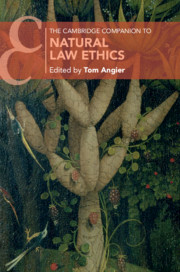Book contents
- The Cambridge Companion to Natural Law Ethics
- Other Volumes in the Series of Cambridge Companions
- The Cambridge Companion to Natural Law Ethics
- Copyright page
- Contents
- Contributors
- Introduction
- Part I The History of Natural Law Ethics
- Part II The Revival of Natural Law Ethics
- Part III Natural Law Ethics and Religion
- 6 Natural Law in Judaism
- 7 Natural Law in Catholic Christianity
- 8 Natural Law in Protestant Christianity
- 9 Natural Law in Islam
- Part IV Applied Natural Law Ethics
- Part V Natural Law Ethics
- References
- Index
- Other Volumes in the Series of Cambridge Companions (continued from page ii)
8 - Natural Law in Protestant Christianity
from Part III - Natural Law Ethics and Religion
Published online by Cambridge University Press: 21 October 2019
- The Cambridge Companion to Natural Law Ethics
- Other Volumes in the Series of Cambridge Companions
- The Cambridge Companion to Natural Law Ethics
- Copyright page
- Contents
- Contributors
- Introduction
- Part I The History of Natural Law Ethics
- Part II The Revival of Natural Law Ethics
- Part III Natural Law Ethics and Religion
- 6 Natural Law in Judaism
- 7 Natural Law in Catholic Christianity
- 8 Natural Law in Protestant Christianity
- 9 Natural Law in Islam
- Part IV Applied Natural Law Ethics
- Part V Natural Law Ethics
- References
- Index
- Other Volumes in the Series of Cambridge Companions (continued from page ii)
Summary
In the mid to late twentieth century, it was the norm for Protestant thinkers to reject natural law ethics. Karl Barth repudiated natural law as insufficiently Christocentric. Reinhold Niebuhr criticised natural law thinking for absolutising the relative. Stanley Hauerwas argued that ‘natural law functions ideologically to justify the assumption that Christians have a responsibility to fulfil the demands of the state and institutions associated with it’, thereby compromising loyalty to Christ. Natural law was regarded as an essentially Catholic approach to Christian moral thinking. It seemed to constrain divine freedom, deny the radical character of the Fall, render scripture secondary and interfere with the intimacy of the divine–human relation. The Reformers, as the story had it, embraced divine command morality, not natural law. Even if there were a natural law embodying God’s will for creation, the Fall rendered access to that law impossible.
- Type
- Chapter
- Information
- The Cambridge Companion to Natural Law Ethics , pp. 155 - 178Publisher: Cambridge University PressPrint publication year: 2019
- 3
- Cited by



